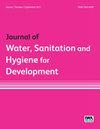通过组建“卫生委员会”在孟加拉国维持以小学为基础的卫生干预:一项试点研究
IF 1.4
4区 环境科学与生态学
Q3 WATER RESOURCES
Journal of Water Sanitation and Hygiene for Development
Pub Date : 2023-09-19
DOI:10.2166/washdev.2023.191
引用次数: 0
摘要
以学校为基础的水、环境卫生和个人卫生(WASH)推广往往缺乏在推广期之后维持行为的策略。本文描述了学校社区参与,以卫生委员会的形式将学校卫生干预制度化及其在实施和可持续性方面的作用。根据四所城市和农村小学现有卫生习惯的形成性数据,我们安排了一个研讨会来设计一种低成本、可接受和可行的卫生干预措施。我们在另外四所学校分别成立了包括学生代表在内的卫生委员会,并对卫生干预措施进行了试点和评估。卫生委员会成员积极支持干预设施、材料和维护,促进有针对性的行为。他们鼓励继续使用卫生用品,并提供资金支付消耗品的费用。教师的承诺、学生的动机和财政成本的回收促进了持续的干预活动。在14个月的跟踪评估期间,卫生委员会的活动仍在所有学校进行。教师和学生在硬件维护方面的双重参与确保了卫生干预耗材在试点学校的可用性、功能性和保持性。卫生委员会促进了干预措施的实施和持续运作。今后的学校干预措施应在实施过程和成本回收战略中考虑这种方法。本文章由计算机程序翻译,如有差异,请以英文原文为准。
Sustaining an elementary school-based hygiene intervention in Bangladesh by forming ‘hygiene committees’: a pilot study
Abstract School-based water, sanitation and hygiene (WASH) promotion often lacks strategies to sustain behaviors beyond the promotion period. This paper describes school community engagement, in the form of a hygiene committee to institutionalize a school-based hygiene intervention and its role in implementation and sustainability. With formative data on existing hygiene practices from four urban and rural elementary schools, we arranged a workshop to design a low cost, acceptable, and feasible hygiene intervention. We formed hygiene committees including student representatives in each of four additional schools, and piloted and assessed the hygiene intervention. The hygiene committee members' active role supported intervention facilities, materials and maintenance, and promoted targeted behaviors. They encouraged continued use of hygiene materials and provided funds to cover the cost of consumables. The teachers' commitment, student motivation, and financial cost recovery facilitated continued intervention activities. During the 14-months follow-up assessment, the hygiene committee activities were still in place in all schools. The dual involvement of teachers and students in hardware maintenance ensured hygiene intervention consumables availability, functionality, and retention in the pilot schools. The hygiene committee facilitated intervention implementation and sustained functionality. Future school interventions should consider this approach in the implementation processes and cost-recovery strategies.
求助全文
通过发布文献求助,成功后即可免费获取论文全文。
去求助
来源期刊

Journal of Water Sanitation and Hygiene for Development
WATER RESOURCES-
CiteScore
3.10
自引率
11.80%
发文量
58
审稿时长
16 weeks
期刊介绍:
The Journal of Water, Sanitation and Hygiene for Development is a peer-reviewed journal devoted to the dissemination of high-quality information on the science, policy and practice of drinking-water supply, sanitation and hygiene at local, national and international levels.
 求助内容:
求助内容: 应助结果提醒方式:
应助结果提醒方式:


